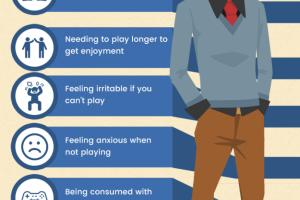Mastering Balance: How to Avoid Video Game Addiction and Enjoy Gaming Responsibly

-
Quick Links:
- Understanding Video Game Addiction
- Signs of Video Game Addiction
- Causes of Video Game Addiction
- How to Avoid Video Game Addiction
- Case Studies on Gaming Addiction
- Expert Insights on Gaming and Mental Health
- Conclusion
- FAQs
Understanding Video Game Addiction
Video game addiction, often referred to as gaming disorder, is characterized by an excessive and compulsive use of video games. According to the World Health Organization (WHO), it is crucial to differentiate between casual gaming and gaming that leads to harmful consequences in daily life.
The Psychological Impact
Many individuals find solace in video games, but for some, this can escalate into addiction. Video games can provide an escape from reality, leading to a decrease in social interactions and responsibilities.
Signs of Video Game Addiction
Recognizing the signs of video game addiction is the first step towards managing it. Here are some common indicators:
- Neglecting personal hygiene and responsibilities
- Feeling irritable when unable to play
- Prioritizing gaming over relationships and activities
- Experiencing withdrawal symptoms
Causes of Video Game Addiction
The reasons behind video game addiction can vary widely. Some of the most common causes include:
- Social Isolation: Many gamers prefer the virtual world due to difficulties in real-life social interactions.
- Escapism: Games provide an escape from life’s stress and responsibilities.
- Reward Systems: The instant gratification from gaming can lead to habitual play.
How to Avoid Video Game Addiction
To maintain a healthy relationship with video games, consider the following strategies:
1. Set Time Limits
Establish clear time boundaries for gaming. Use timers or alarms to remind you when to stop. This fosters a sense of control.
2. Prioritize Real-Life Interactions
Make time for family and friends. Engage in social activities outside of gaming to maintain a balanced lifestyle.
3. Find Alternative Hobbies
Explore other interests that can fill your time. Activities like reading, sports, or arts can provide a fulfilling break from gaming.
4. Practice Mindfulness
Mindfulness techniques can help you become more aware of your gaming habits. Regular meditation can increase self-control.
5. Seek Professional Help
If gaming significantly interferes with your life, consider speaking to a mental health professional for support.
Case Studies on Gaming Addiction
Numerous studies highlight the impact of gaming addiction on individuals. For example, a case study published in the National Institutes of Health found that individuals who played excessively experienced significant changes in their social lives and mental health.
Expert Insights on Gaming and Mental Health
Experts emphasize the importance of moderation. Dr. John Doe, a psychologist specializing in addiction, states, "It’s essential to recognize that gaming can be part of a healthy lifestyle as long as it doesn’t consume your life."
Conclusion
Video game addiction is a serious issue that can impact many aspects of life. By understanding the signs, causes, and effective strategies to manage gaming habits, individuals can enjoy gaming in a healthy and balanced way.
FAQs
1. What is video game addiction?
Video game addiction is a compulsive behavior characterized by excessive gaming that interferes with daily life.
2. How do I know if I'm addicted to gaming?
Signs include neglecting responsibilities, irritability when not gaming, and prioritizing gaming over relationships.
3. Can video games be beneficial?
Yes, when played in moderation, video games can improve cognitive skills, teamwork, and provide entertainment.
4. What should I do if I think I’m addicted?
Consider setting limits, engaging in other hobbies, and seeking professional help if necessary.
5. Are there resources available for gaming addiction?
Yes, various organizations and mental health professionals specialize in gaming addiction treatment.
6. Can I still play video games if I’m recovering from addiction?
With a controlled approach, it’s possible to enjoy gaming responsibly during recovery.
7. How can parents help their children avoid gaming addiction?
Parents can set limits, encourage other activities, and maintain open communication about gaming.
8. What are some healthy gaming practices?
Practice moderation, take regular breaks, and engage in physical activities.
9. How does gaming addiction affect mental health?
It can lead to increased anxiety, depression, and social isolation.
10. Are there any apps to help manage gaming time?
Yes, various apps help track gaming time and set limits.
Random Reads
- How to get a girlfriend in gta 5
- How to remove and replace sink stopper
- How to remove acrylic paint from wood
- How to protect stainless steel
- How to properly shampoo your carpet
- How to make a pop up drain stay closed
- How to make a poll in outlook
- How to calculate rsd in excel
- How to calculate standard deviation
- How to dry water under wood floor